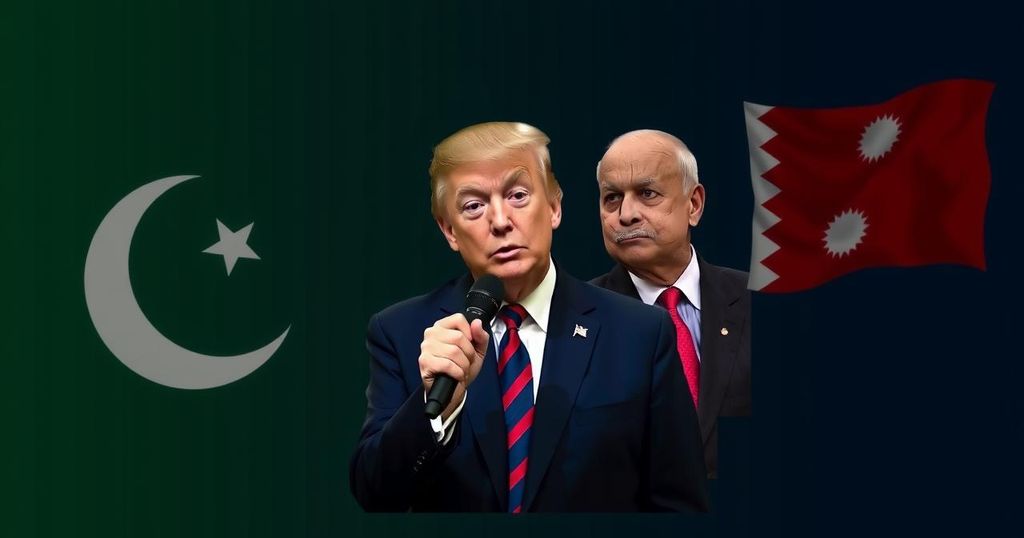Donald J. Trump’s return as U.S. President elicits varied reactions from South Asian countries, with concerns over trade, climate policy, and bilateral ties emerging. Editorials from Pakistan, Bangladesh, Nepal, and Sri Lanka reveal a mixture of wariness and cautious optimism as leaders brace for potential implications of Trump’s second term.
Former President Donald J. Trump’s recent election as the 47th President of the United States has generated a flurry of speculation regarding the potential implications for the South Asian subcontinent. Following the November 5 elections, the reactions from Pakistan, Bangladesh, Nepal, and Sri Lanka highlight varying sentiments and concerns about his policies. Experts suggest that financial pressures within the U.S., such as inflation, and Trump’s strained relations with Democrats influenced voter preferences. Editorials from the region reflect anxieties related to trade, climate policy, and the geopolitical dynamics arising under Trump’s leadership. In Pakistan, the editorial of Dawn emphasized that Trump’s return heralds a continuation of lukewarm ties under previous administrations, stating, “there is little to suggest an improvement in relations under the new Trump set-up.” The commentary focuses on historical grievances and anticipates muted diplomatic engagement. Conversely, Bangladesh’s Daily Star discussed the electoral context, drawing attention to Trump’s comments on violence against minorities, which evoked concerns that the U.S. may assess Bangladesh through an Indian perspective. Despite anxiety over Trump’s climate change skepticism, the article reflected tentative optimism about strengthening bilateral ties, underlining the importance of proactive engagement by the Bangladeshi government. The Kathmandu Post from Nepal critiqued the voting patterns in America, indicating a disconnection between the electorate and rational decision-making, suggesting that emotions guided voter behavior. The editorial cautioned that Nepal could be disproportionately vulnerable to authoritarianism if populist tactics were embraced by leaders, as “a country like Nepal with its weak institutions will be a lot more vulnerable to despotism.” Sri Lanka’s The Island voiced skepticism about Trump’s return, with references to the potential repercussions for trade and foreign policy issues like the Gaza conflict and NATO relations. Acknowledging the political irony of local leaders congratulating Trump, it conveyed uncertainty about whether his presidency would yield improvements compared to the Biden administration, remarking, “one may not know, but his presidency surely won’t be worse than Biden’s.” These analyses from diverse South Asian perspectives reveal a region grappling with the implications of a Trump presidency, marking a critical juncture in understanding diplomatic landscapes influenced by U.S. leadership.
The election of Donald Trump to the presidency is significant not only for the United States but also for the geopolitical landscape of South Asia. Countries such as Pakistan, Bangladesh, Nepal, and Sri Lanka have historically navigated complex relationships with the U.S., and they perceive Trump’s return as a potential shift in longstanding policies. Each nation presents unique concerns about political dynamics, economic engagement, and the broader implications of U.S. foreign policy under Trump’s leadership, especially regarding trade and climate issues that resonate within these developing contexts.
In summary, Trump’s second term raises concerns about continued geopolitical tensions and the potential reconfiguration of U.S. relations with South Asian nations. Each editorial reflects a mix of wariness and cautious optimism, emphasizing the importance of diplomatic engagement to navigate the complexities presented by a Trump presidency. As the leaders of Pakistan, Bangladesh, Nepal, and Sri Lanka assess their positions, the upcoming years will be critical in determining the trajectory of regional relations with the U.S.
Original Source: indianexpress.com






